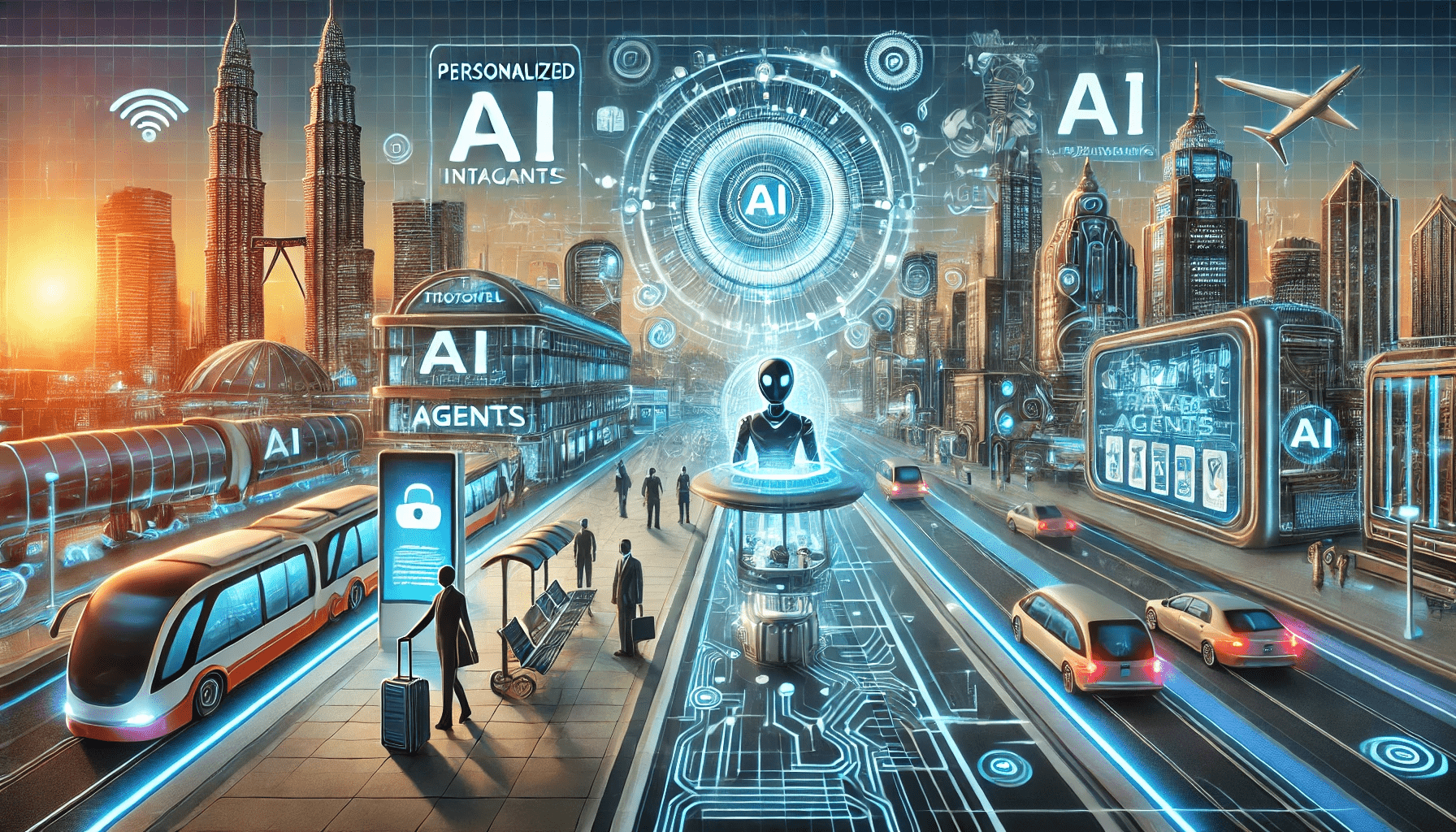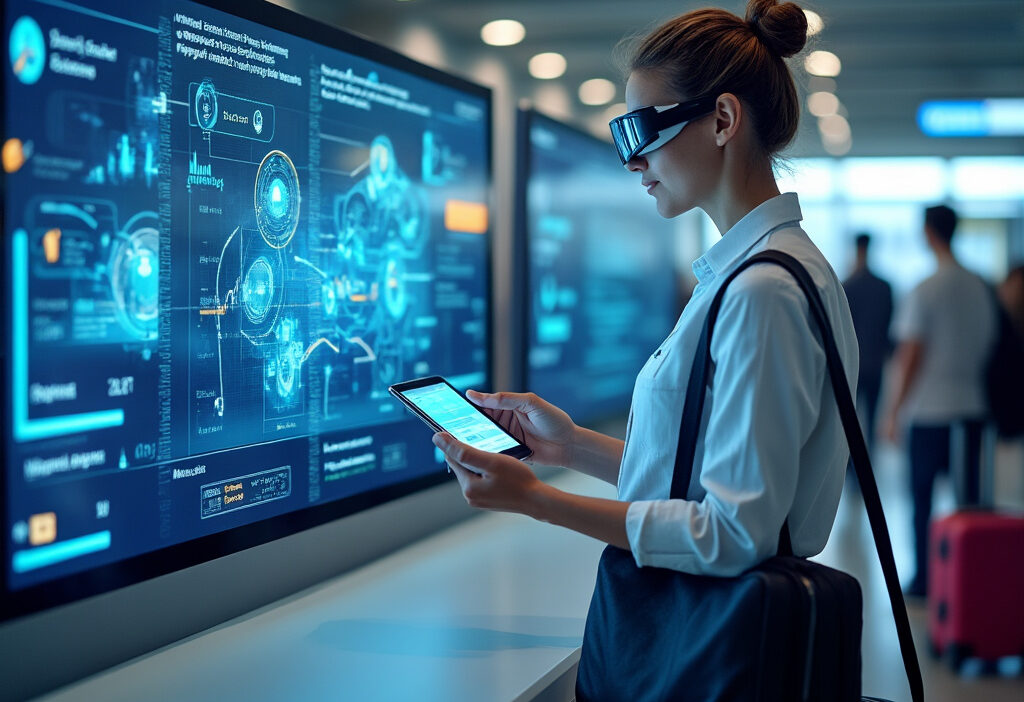Navigating New Horizons: AI’s Transformative Role in Travel by 2025
As of 2025, artificial intelligence (AI) has reshaped the travel industry at its core, revolutionizing how we plan, experience, and reflect on our journeys. This transformation spans from AI-enhanced personalization and booking to immersive virtual experiences, signaling a new era of travel defined by efficiency, customization, and innovation.
AI’s Rise in Travel: An Overview
The integration of artificial intelligence into the travel industry didn’t happen overnight—it was a gradual evolution, marked by key technological breakthroughs that reshaped how we explore the world. Early applications of AI in travel were rudimentary, focusing on automating basic tasks like flight searches or hotel bookings. However, these foundational systems laid the groundwork for the sophisticated AI-driven ecosystem we see today.
By the mid-2010s, chatbots and virtual assistants began handling customer inquiries, reducing response times from hours to seconds. These early AI tools relied on rule-based algorithms, but advancements in machine learning soon enabled them to understand natural language, making interactions more intuitive. The introduction of neural networks and deep learning in the late 2010s allowed AI to analyze vast datasets, predicting traveler preferences with startling accuracy.
The real turning point came with the rise of generative AI in the early 2020s. Systems like OpenAI’s GPT models revolutionized customer service, enabling dynamic, context-aware conversations that mimicked human agents. Meanwhile, AI-powered predictive analytics transformed pricing strategies, allowing airlines and hotels to adjust rates in real-time based on demand, weather, and even social media trends.
By 2025, AI has become the backbone of travel operations, seamlessly integrating with IoT devices, biometric systems, and blockchain for secure, frictionless experiences. From autonomous check-ins to AI-curated itineraries, the industry now thrives on hyper-efficiency and personalization—a far cry from the rigid, manual processes of the past. These advancements didn’t just optimize travel; they redefined it, setting the stage for even deeper AI-driven personalization, as we’ll explore in the next chapter.
Personalization and Recommendations
In 2025, AI-driven personalization has redefined how travelers discover and book experiences, moving far beyond generic suggestions to hyper-tailored recommendations. By analyzing vast datasets—including past bookings, browsing behavior, social media activity, and even real-time contextual data—AI engines now craft journeys that feel uniquely personal. Unlike earlier systems that relied on simple filters, today’s algorithms employ deep learning to predict preferences, often before users articulate them.
The shift from rule-based recommendations to dynamic, adaptive models has been transformative. For instance, AI now considers subtle factors like mood (inferred from interaction patterns), local events, and even weather forecasts to suggest activities. A traveler who once received generic “top 10” lists might now get a curated itinerary aligning with their love for hidden-gem cafes and rainy-day museum visits—all optimized for their schedule.
Engagement metrics reflect this leap. Platforms using advanced personalization report 30-50% higher click-through rates and 20% more repeat bookings compared to 2020-era systems. The secret lies in AI’s ability to continuously learn. For example, if a user hesitates on luxury hotel offers but consistently books boutique stays, the system adapts in real time, refining future suggestions.
Collaborative filtering, once limited to broad user segments, now operates at micro-levels, cross-referencing niche traveler profiles to surface unexpected yet relevant options. This granularity extends to pricing, with AI dynamically bundling flights, stays, and activities based on individual spending patterns. The result? Travelers feel understood, not targeted—a nuance that’s driven loyalty and satisfaction to unprecedented highs.
As AI grows more intuitive, the line between recommendation and anticipation blurs, setting the stage for the next frontier: smart booking, where AI doesn’t just suggest but seamlessly orchestrates entire trips.
The Smart Booking Experience
In 2025, the travel booking experience has been transformed by AI, eliminating the tedious, manual processes of the past. Advanced predictive analytics and machine learning algorithms now power platforms that not only simplify trip planning but also optimize costs and efficiency in ways previously unimaginable.
One of the most significant breakthroughs is AI’s ability to analyze historical pricing trends, seasonal demand fluctuations, and even geopolitical events to suggest the best booking windows. Platforms like SmartJourney and OptiTrip leverage these insights, dynamically adjusting recommendations to ensure travelers secure the lowest fares and best accommodations. For instance, if an algorithm detects an upcoming drop in hotel rates due to an oversupply, it delays booking until the optimal moment, saving users an average of 15-20% on stays.
AI also streamlines itinerary planning by automating complex logistics. Instead of juggling multiple tabs and apps, travelers now rely on integrated platforms that sync flights, hotels, ground transport, and activities into a cohesive plan. TravelGenius, for example, uses reinforcement learning to adjust itineraries in real time based on delays, weather disruptions, or even personal preferences detected through past behavior.
Additionally, AI-driven negotiation bots have emerged, leveraging collective bargaining power. Services like BidVoyage aggregate user demand to negotiate bulk discounts with airlines and hotels, passing savings directly to consumers.
These innovations mark a shift from reactive to proactive travel planning, where AI doesn’t just assist—it anticipates. As we move toward even more interactive AI solutions, the next frontier lies in seamless voice and chatbot integrations, further bridging the gap between planning and real-time assistance.
Voice Assistants and Chatbots
In 2025, AI-driven voice assistants and chatbots have become indispensable in the travel sector, transforming customer service into a seamless, conversational experience. Powered by advanced natural language processing (NLP), these tools understand and respond to traveler queries with near-human precision, eliminating the frustration of rigid, scripted interactions. Whether booking a last-minute hotel, resolving a flight delay, or suggesting personalized itineraries, these AI agents handle it all in real time, adapting to context, tone, and even regional dialects.
The impact is profound. Travelers no longer wait on hold or navigate labyrinthine phone menus. Instead, voice-enabled assistants like AI concierges embedded in smart devices or hotel rooms provide instant support, from adjusting reservations to recommending local hidden gems. Chatbots, integrated into airline and hotel apps, leverage historical data and real-time analytics to offer proactive solutions—like rebooking a connecting flight before the traveler even notices a delay.
Behind the scenes, machine learning continuously refines these interactions. For instance, if a user frequently asks about vegan dining options, the system prioritizes such suggestions in future conversations. Meanwhile, sentiment analysis detects frustration or urgency, escalating issues to human agents when necessary—blending efficiency with empathy.
This evolution doesn’t just enhance convenience; it redefines trust. With 24/7 availability and multilingual capabilities, AI bridges gaps for global travelers, ensuring no request gets lost in translation. As we’ll explore next, these advancements also unlock operational efficiencies, but here, the focus is on the humanized touch of AI—making every journey feel effortlessly supported.
Operational Efficiency and Cost Savings
In 2025, artificial intelligence has become the silent engine driving operational efficiency and cost savings across the travel industry. By leveraging dynamic pricing algorithms, airlines, hotels, and ride-sharing services optimize revenue while offering competitive rates. These AI systems analyze vast datasets—including demand fluctuations, weather patterns, and competitor pricing—to adjust fares in real time. For travelers, this means more transparent pricing, while providers benefit from maximized occupancy and reduced revenue leakage.
Predictive analytics further refine operations, minimizing delays and resource waste. Airlines use AI to forecast maintenance needs, reducing unplanned downtime and costly last-minute repairs. Similarly, hotels employ smart inventory management, predicting peak occupancy periods to optimize staffing and energy consumption. These advancements translate into lower operational costs, savings that often trickle down to consumers through better deals and improved service quality.
Behind the scenes, AI-driven logistics streamline supply chains, ensuring timely deliveries of essentials like in-flight meals or hotel amenities. Automated systems track inventory levels and predict shortages, eliminating overstocking and waste. For ground transportation, route optimization algorithms cut fuel costs and reduce emissions, aligning economic benefits with sustainability goals.
The economic implications are profound. Travel providers that embrace AI see higher profit margins without sacrificing customer satisfaction. As the industry’s backbone grows smarter, the ripple effects extend beyond cost savings—enabling smoother, more reliable journeys. This sets the stage for the next frontier: biometric breakthroughs, where AI’s efficiency meets enhanced security to redefine the travel experience.
Biometric Breakthroughs in Security
In 2025, biometric technology powered by AI has become the cornerstone of travel security, reshaping how passengers move through airports and hotels with unprecedented speed and precision. Facial recognition, iris scanning, and fingerprint authentication have replaced traditional boarding passes and ID checks, slashing wait times while enhancing safety. Airports now deploy AI-driven biometric gates that authenticate travelers in seconds, linking their biometric data to flight details and immigration records seamlessly. This shift not only minimizes human error but also thwarts identity fraud, as AI cross-references live data with global security databases in real time.
Hotels have embraced the trend, using biometric check-ins to personalize guest experiences. Upon arrival, a quick facial scan confirms reservations, unlocks rooms, and even tailors in-room preferences—from lighting to temperature—based on past stays. Behind the scenes, AI algorithms analyze behavioral patterns to flag anomalies, such as unrecognized individuals accessing restricted areas, ensuring proactive security without intrusive measures.
However, the rapid adoption of biometrics raises critical discussions about privacy and data protection. While travelers enjoy frictionless journeys, regulators and tech firms collaborate to enforce strict encryption protocols and opt-in policies, ensuring biometric data isn’t misused. The balance between convenience and surveillance remains delicate, but with blockchain-secured databases and decentralized identity systems, 2025’s travel industry demonstrates that security and efficiency can coexist.
As biometrics streamline logistics, the next frontier lies in blending these advancements with immersive technologies—augmented and virtual reality—to further redefine exploration. The foundation laid by AI-driven security paves the way for a future where travel is not only safer but also more intuitive and engaging.
Augmented and Immersive Travel Experiences
In 2025, AI-powered augmented and immersive travel experiences are redefining how we explore the world. By seamlessly blending augmented reality (AR) and virtual reality (VR) with real-world travel, AI is crafting deeply personalized journeys that were once the stuff of science fiction. Travelers can now preview destinations in stunning detail before booking, thanks to AI-generated VR simulations that adapt to individual preferences—whether it’s a sunset stroll on a remote beach or a guided tour of ancient ruins.
Personalized Tours have become a cornerstone of modern travel. AI analyzes user behavior, interests, and past trips to curate AR-enhanced itineraries. Imagine walking through Rome while your AR glasses overlay historical reconstructions of the Colosseum, or receiving real-time translations of street signs in Tokyo—all powered by AI’s contextual understanding. These tools don’t just inform; they engage, turning every trip into an interactive storytelling experience.
For destinations, this technology is a game-changer in marketing and engagement. Tourism boards leverage AI-driven VR previews to showcase hidden gems, enticing travelers with hyper-realistic glimpses of off-the-beaten-path locales. Hotels use AR to let guests visualize room layouts or amenities before check-in, reducing uncertainty and boosting satisfaction.
The line between digital and physical travel is blurring. AI doesn’t replace the joy of discovery—it amplifies it, offering layers of context and customization that make every journey richer. As biometric advancements streamline logistics (as discussed earlier), these immersive experiences ensure the journey itself becomes as memorable as the destination. And with the market poised for explosive growth (as we’ll explore next), AI’s role in shaping travel is only beginning.
The Market’s Response and Growth
The travel industry is undergoing a seismic shift as AI-driven innovations redefine market dynamics and fuel unprecedented economic growth. By 2027, the global AI in travel market is projected to surpass $30 billion, driven by rapid advancements in automation, predictive analytics, and hyper-personalization. This surge reflects not just technological adoption but a fundamental transformation in how travel businesses operate and compete.
Key factors propelling this growth include:
- Operational efficiency: AI streamlines everything from dynamic pricing to inventory management, reducing costs and boosting profitability for airlines, hotels, and OTAs.
- Consumer adoption: Over 65% of travelers now prefer AI-powered tools for itinerary planning and real-time assistance, signaling a shift toward tech-enabled convenience.
- Emerging markets: Regions like Asia-Pacific are leading AI integration, with chatbots and voice assistants becoming ubiquitous in customer service.
The tourism sector’s reliance on AI is no longer optional but a competitive necessity. For instance, AI-driven demand forecasting helps hotels optimize occupancy rates, while sentiment analysis tools enable destinations to tailor marketing campaigns. Startups specializing in AI concierges and biometric travel verification are attracting record investments, further accelerating market expansion.
Yet, challenges persist. Smaller players face hurdles in adopting AI due to high implementation costs, risking marginalization. Meanwhile, data privacy concerns loom as personalization deepens. Despite this, the trajectory is clear: AI is not just augmenting travel—it’s rewriting the industry’s economic playbook, creating a landscape where agility and innovation dictate success. The next frontier lies in meeting the soaring expectations of travelers, as explored in the following chapter.
Evolving Consumer Expectations
By 2025, AI has fundamentally altered what travelers expect from their journeys. No longer satisfied with generic itineraries or reactive customer service, consumers now demand hyper-personalized experiences that anticipate their needs before they arise. AI’s ability to analyze vast datasets—from past bookings to real-time preferences—has enabled travel providers to craft bespoke journeys that feel effortless. Whether it’s suggesting a secluded beach based on a traveler’s social media activity or adjusting a hotel room’s temperature before arrival, AI-driven personalization has become the new standard.
The shift toward proactive service delivery is equally transformative. AI-powered chatbots and virtual assistants now resolve issues before travelers even notice them, from rebooking flights during delays to recommending alternative dining options when a restaurant is overcrowded. This level of responsiveness fosters deep loyalty, as travelers feel understood and valued. Companies leveraging these tools see higher retention rates, with AI’s predictive capabilities turning one-time customers into lifelong advocates.
Moreover, AI has redefined convenience. Voice-activated travel planning, biometric check-ins, and dynamic pricing adjusted in real-time are no longer futuristic concepts but everyday expectations. Travelers now assume seamless integration across platforms, where AI synchronizes flights, accommodations, and activities into a unified, stress-free experience.
As the market continues to evolve, AI’s role in meeting these elevated expectations will only grow. The next frontier lies in aligning these advancements with sustainability, ensuring that personalized, effortless travel doesn’t come at the planet’s expense—a challenge AI is uniquely equipped to tackle.
Sustainability and AI: Pioneering Responsible Travel
As travelers increasingly prioritize sustainability, AI has emerged as a critical enabler of responsible tourism. By 2025, AI-driven solutions are not just enhancing convenience but actively reducing the environmental impact of travel. From optimizing logistics to empowering eco-conscious decisions, AI is reshaping how the industry approaches sustainability.
Carbon Footprint Reduction is one of AI’s most significant contributions. Advanced algorithms analyze vast datasets—flight emissions, hotel energy consumption, and transportation modes—to recommend the lowest-impact options. Travel platforms now integrate real-time carbon calculators, allowing users to compare routes and accommodations based on sustainability metrics. For instance, AI might suggest a slightly longer train journey over a short-haul flight, cutting emissions by up to 80%.
Smart Route Optimization further minimizes environmental harm. AI-powered navigation systems consider factors like traffic congestion, fuel efficiency, and even weather conditions to plot the most eco-friendly paths. Airlines and logistics providers leverage predictive analytics to optimize flight paths and cargo loads, reducing fuel burn and emissions.
Beyond logistics, AI fosters conscious consumer behavior. Chatbots and virtual assistants educate travelers on sustainable practices, from waste reduction to supporting local economies. Hotels employ AI to manage energy usage dynamically, adjusting lighting and HVAC systems based on occupancy.
The shift toward responsible travel isn’t just a trend—it’s a necessity. AI bridges the gap between convenience and sustainability, ensuring that the journeys of 2025 leave a lighter footprint while meeting the heightened expectations of today’s eco-aware travelers.

Conclusions
Artificial intelligence has become the linchpin in delivering a sophisticated, seamless, and highly personalized travel experience by 2025. As we look towards the future, the intersection of AI and travel promises not only enhanced operational efficiencies for providers but also unprecedented convenience and pleasure for travelers worldwide.



